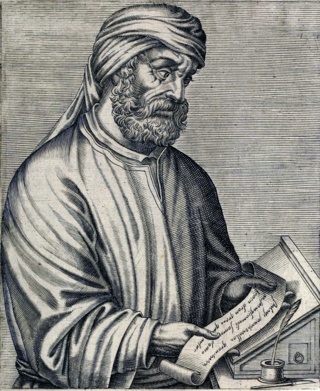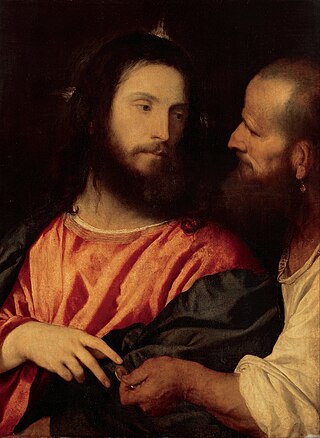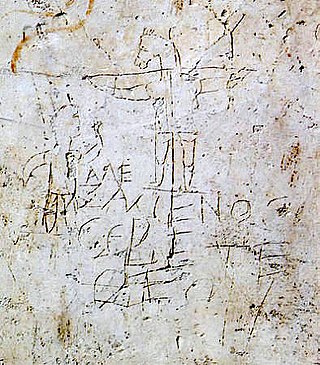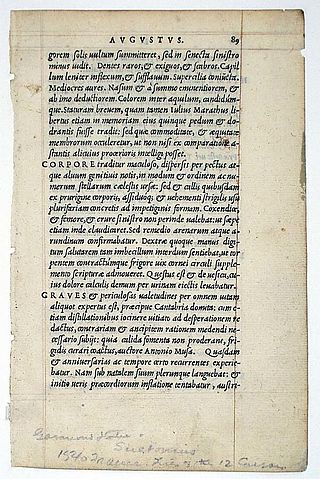
Julian was the Caesar of the West from 355 to 360 and Roman emperor from 361 to 363, as well as a notable philosopher and author in Greek. His rejection of Christianity, and his promotion of Neoplatonic Hellenism in its place, caused him to be remembered as Julian the Apostate in Christian tradition. He is sometimes referred to as Julian the Philosopher.

Tertullian was a prolific early Christian author from Carthage in the Roman province of Africa. He was the first Christian author to produce an extensive corpus of Latin Christian literature and was an early Christian apologist and a polemicist against heresy, including contemporary Christian Gnosticism. Tertullian has been called "the father of Latin Christianity", as well as "the founder of Western theology".

Abellio was a god worshiped in the Garonne Valley in Gallia Aquitania, known primarily by a number of inscriptions which were discovered in Comminges, in the Pyrenees. He may have been a god of apple trees or the sun.
Marcionism was an early Christian dualistic belief system that originated with the teachings of Marcion of Sinope in Rome around 144 AD. Marcion was an early Christian theologian, evangelist, and an important figure in early Christianity. He was the son of a bishop of Sinope in Pontus. About the middle of the 2nd century (140–155) he traveled to Rome, where he joined the Syrian Gnostic Cerdo.

The Edict of Milan was the February 313 AD agreement to treat Christians benevolently within the Roman Empire. Western Roman Emperor Constantine I and Emperor Licinius, who controlled the Balkans, met in Mediolanum and, among other things, agreed to change policies towards Christians following the edict of toleration issued by Emperor Galerius two years earlier in Serdica. The Edict of Milan gave Christianity legal status and a reprieve from persecution but did not make it the state church of the Roman Empire, which occurred in AD 380 with the Edict of Thessalonica.

As the Roman Republic, and later the Roman Empire, expanded, it came to include people from a variety of cultures, and religions. The worship of an ever increasing number of deities was tolerated and accepted. The government, and the Romans in general, tended to be tolerant towards most religions and religious practices. Some religions were banned for political reasons rather than dogmatic zeal, and other rites which involved human sacrifice were banned.

"Render unto Caesar" is the beginning of a phrase attributed to Jesus in the synoptic gospels, which reads in full, "Render unto Caesar the things that are Caesar's, and unto God the things that are God's".
Anti-Judaism describes a range of historic and current ideologies which are totally or partially based on opposition to Judaism, on the denial or the abrogation of the Mosaic covenant, and the replacement of Jewish people by the adherents of another religion, political theology, or way of life which is held to have superseded theirs as the "light to the nations" or God's chosen people. The opposition is maintained by the appropriation and adaptation of Jewish prophecy and texts, and the stigmatization of the very people who transmitted those texts. According to David Nirenberg there have been Christian, Islamic, nationalistic, Enlightenment rationalist, and socio-economic variations of this theme.

The Alexamenos graffito is a piece of Roman graffito scratched in plaster on the wall of a room near the Palatine Hill in Rome, Italy, which has now been removed and is in the Palatine Museum. It may be meant to depict Jesus; if so, it competes with an engraved gem held in the British Museum as the earliest known pictorial representation of the Crucifixion of Jesus. It is hard to date, but has been estimated to have been made around the year 200 AD. The image seems to show a young man worshipping a crucified, donkey-headed figure. The Greek inscription approximately translates to "Alexamenos worships [his] god," indicating that the graffito was apparently meant to mock a Christian named Alexamenos.

Paganism is commonly used to refer to various religions that existed during Antiquity and the Middle Ages, such as the Greco-Roman religions of the Roman Empire, including the Roman imperial cult, the various mystery religions, religions such as Neoplatonism and Gnosticism, and more localized ethnic religions practiced both inside and outside the empire. During the Middle Ages, the term was also adapted to refer to religions practiced outside the former Roman Empire, such as Germanic paganism, Egyptian paganism and Baltic paganism.

Christians were persecuted, sporadically and usually locally, throughout the Roman Empire, beginning in the 1st century AD and ending in the 4th century. Originally a polytheistic empire in the traditions of Roman paganism and the Hellenistic religion, as Christianity spread through the empire, it came into ideological conflict with the imperial cult of ancient Rome. Pagan practices such as making sacrifices to the deified emperors or other gods were abhorrent to Christians as their beliefs prohibited idolatry. The state and other members of civic society punished Christians for treason, various rumored crimes, illegal assembly, and for introducing an alien cult that led to Roman apostasy. The first, localized Neronian persecution occurred under Emperor Nero in Rome. A more general persecution occurred during the reign of Marcus Aurelius. After a lull, persecution resumed under Emperors Decius and Trebonianus Gallus. The Decian persecution was particularly extensive. The persecution of Emperor Valerian ceased with his notable capture by the Sasanian Empire's Shapur I at the Battle of Edessa during the Roman–Persian Wars. His successor, Gallienus, halted the persecutions.
Religio licita is a phrase used in the Apologeticum of Tertullian to describe the special status of the Jews in the Roman Empire. It was not an official term in Roman law.

The First Apology was an early work of Christian apologetics addressed by Justin Martyr to the Roman Emperor Antoninus Pius. In addition to arguing against the persecution of individuals solely for being Christian, Justin also provides the Emperor with a defense of the philosophy of Christianity and a detailed explanation of contemporary Christian practices and rituals. This work, along with the Second Apology, has been cited as one of the earliest examples of Christian apology, and many scholars attribute this work to creating a new genre of apology out of what was a typical Roman administrative procedure.

Christianity in the ante-Nicene period was the time in Christian history up to the First Council of Nicaea. This article covers the period following the Apostolic Age of the first century, c. 100 AD, to Nicaea in 325 AD.
The True Word is a lost treatise in which the ancient Greek philosopher Celsus addressed many principal points of early Christianity and refuted or argued against their validity. In The True Word, Celsus attacked Christianity in three ways: by refuting its philosophical claims, by marking it as a phenomenon associated with the uneducated and lower class, and by cautioning his audience that it was a danger to the Roman Empire. Information concerning the work exists only in the extensive quotations from it in the Contra Celsum, written some seventy years later by the Christian Origen. These are believed to be accurate as far as they go, but may not give a fully comprehensive picture of the original work.

In ancient Roman religion, Mutunus Tutunus or Mutinus Titinus was a phallic marriage deity, in some respects equated with Priapus. His shrine was located on the Velian Hill, supposedly since the founding of Rome, until the 1st century BC.
Against the Galileans, meaning Christians, was a Greek polemical essay written by the Roman emperor Julian, commonly known as Julian the Apostate, during his short reign (361–363). Despite having been originally written in Greek, it is better known under its Latin name, probably due to its extensive reference in the polemical response Contra Julianum by Cyril of Alexandria.

Pliny the Younger, the Roman governor of Bithynia and Pontus, wrote a letter to Emperor Trajan around AD 110 and asked for counsel on dealing with the early Christian community. The letter details an account of how Pliny conducted trials of suspected Christians who appeared before him as a result of anonymous accusations and asks for the Emperor's guidance on how they should be treated.

The Roman historian Suetonius mentions early Christians and may refer to Jesus Christ in his work Lives of the Twelve Caesars. One passage in the biography of the Emperor Claudius Divus Claudius 25, refers to agitations in the Roman Jewish community and the expulsion of Jews from Rome by Claudius during his reign, which may be the expulsion mentioned in the Acts of the Apostles. In this context "Chresto" is mentioned. Some scholars see this as a likely reference to Jesus, while others see it as referring to another person living in Rome, of whom we have no information.

The Religious policies of Constantine the Great have been called "ambiguous and elusive." Born in 273 during the Crisis of the Third Century, Constantine the Great was thirty at the time of the Great Persecution. He saw his father become Augustus of the West and then shortly die. Constantine spent his life in the military warring with much of his extended family, and converted to Christianity sometime around 40 years of age. His religious policies, formed from these experiences, comprised increasing toleration of Christianity, limited regulations against Roman polytheism with toleration, participation in resolving religious disputes such as schism with the Donatists, and the calling of councils including the Council of Nicaea concerning Arianism. John Kaye characterizes the conversion of Constantine, and the Council of Nicea that Constantine called, as two of the most important things to ever happen to the Christian church.















